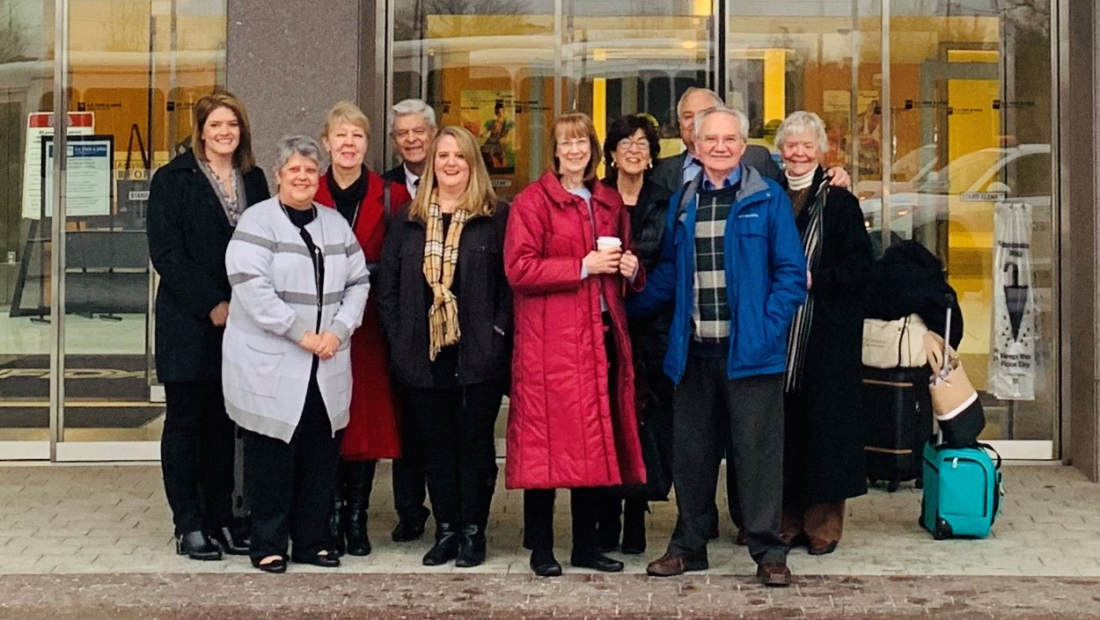Nancy Patterson was driving back from the beach in Jacksonville, Fla., in 1987 when her heart began to pound. With one hand on the steering wheel and the other clutching her chest, Patterson, who was 44 years old at the time, immediately knew something was wrong.
Over the next few months, Patterson visited a series of doctors. She felt weak walking up the three steps from the parking lot to her office. She passed out on a treadmill from high blood pressure and a high pulse. Her heart kept pounding.
Patterson, who now lives in Hendersonville, ultimately went to see an endocrinologist, who discovered she had an overactive thyroid. Many tests and treatments later, she received her diagnosis: Graves’ disease.
Hard to see
Graves’ disease is an autoimmune disorder that causes overactivity in the thyroid gland, according to the American Thyroid Association. The disease — which many people know as the condition that afflicted President George H.W. Bush and his wife, Barbara — is seven times more common in women and is the leading cause of hyperthyroidism in the United States. The ATA recognizes July as Graves’ Disease Awareness Month.
Ordinarily, says Patterson, Graves’ disease is difficult to diagnose because it can mimic so many other conditions. Symptoms can include racing heartbeat, weak muscles, hand tremors, trouble sleeping, weight loss and heat intolerance.
Many people with Graves’ disease also develop thyroid eye disease, an associated condition that typically manifests within six months of a Graves’ disease diagnosis, according to the ATA. The condition can cause a gritty feeling in the eyes, swelling of the eyelids, excessive tearing, dry eyes and double vision.
“This really is a very debilitating disease,” says Dr. Robert Wiggins, a neuro-opthamologist at Asheville Eye Associates who works with thyroid eye and Graves’ disease patients. “It can suddenly change your appearance and it can affect your visual function.”
Patterson chuckles as she recalls going out to breakfast soon after her diagnosis and pouring cream into her coffee cup — or so she thought, before the cream dripped off the table. She had poured into the cup manifested by her double vision.
“You learn how to deal with it,” Patterson says. “For instance, you learn to run your finger along the wall when you’re walking down a hallway so you know where you are.”
Building a foundation
Three years after her diagnosis, Patterson had her first ophthalmic reconstructive surgery to help with her thyroid eye disease. She was still in the hospital when she asked her surgeon about support groups. To her shock, there weren’t any.
With the help of her surgeon, Dr. Clinton McCord, and her endocrinologist, Dr. Robert Bucher, Patterson founded the Graves’ Disease and Thyroid Foundation in 1990. The nonprofit seeks to provide patient support, public education about the disease and funding for research. Since its inception, the group has grown to include 195 individual, physician and corporate members, according to data from 2019.
The foundation also hosts webinars and a community forum for Graves’ patients, Patterson says, and is currently working to bring more support groups online.
“Most of the people that have Graves’ that still call me say they’ve never heard of it or know anyone who’s had it,” she explains. “And that’s been true for all of these 30 years. To get them together — it’s a different approach than looking up information online or on Twitter. It’s, for a lack of a better word, more personal.”
Two North Carolina support groups, in Charlotte and Raleigh, are listed on the foundation’s website; Patterson says both are inactive but hopes to get them up and running again in the next few months. Another group met in Brevard in the late 1990s, she adds, but it disbanded in 2003.
Above all, Patterson hopes her foundation helps others with the illness feel less alone.
“There’s now treatment for the disease; before, there used to just be management,” she says. “In my opinion, that’s the biggest news since Santa Claus. But it’s all about early intervention and talking about it — for goodness’ sake, talk to somebody!”



Before you comment
The comments section is here to provide a platform for civil dialogue on the issues we face together as a local community. Xpress is committed to offering this platform for all voices, but when the tone of the discussion gets nasty or strays off topic, we believe many people choose not to participate. Xpress editors are determined to moderate comments to ensure a constructive interchange is maintained. All comments judged not to be in keeping with the spirit of civil discourse will be removed and repeat violators will be banned. See here for our terms of service. Thank you for being part of this effort to promote respectful discussion.